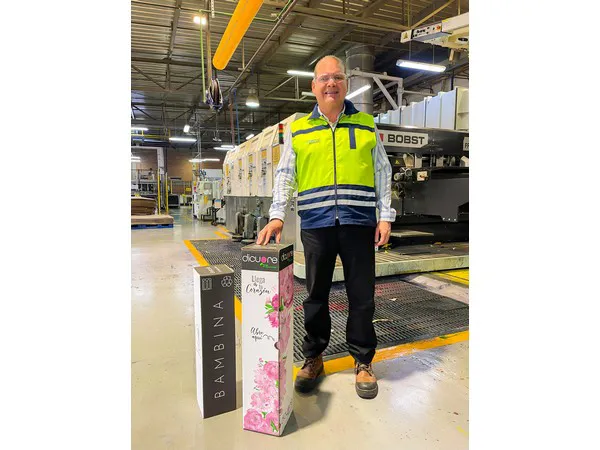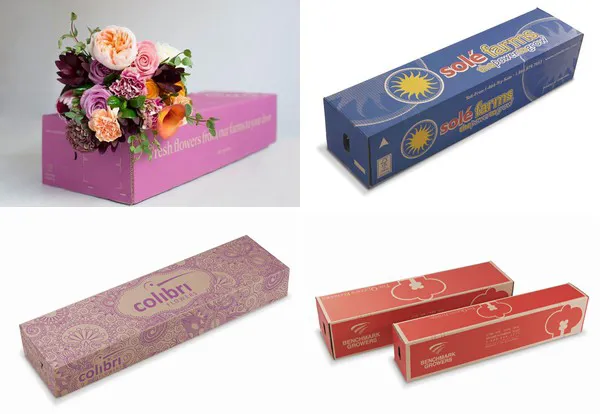"We want to grow with our growers", might sound cliche, but in times of scarcity of raw materials, it is not always possible for suppliers to do so. Looking at the cardboard industry for example. A rise in flower shipments means an increase in demand for cardboard. Worldwide, however, there is a scarcity of paper and other raw materials. Unless you produce it yourself, like Smurfit Kappa through its forest plantations in Colombia. Over the last Covid-19 years, they have not only been able to supply their growers, but they were also able to quickly respond to the changing demand with speed to market, like the 'directly from the farm to the end consumer' trend. In this article José María Estela, the General Manager of Smurfit Kappa Bogotá, tells us all about it, but also about the current challenges they are facing and their future plans.

José María Estela
Direct supply
In Colombia, Smurfit Kappa serves about 70% of all growers. When Covid-19 hit the United States - Colombia's main market- they were expecting a recession for the floral industry, but it was not the case. Taking into account different aspects such as the increase in teleworking and nationwide advertising that flowers are good for mental health with from a house to home advertisements, demand not only increased, it also changed, explains Estela. "Usually, the flowers are shipped to Miami where they are being unpacked and repacked. As there was a lack of people working in Miami, the demand for direct supply started to arise. More and more growers found ways to start supplying the end-consumer directly. And even initiatives like supply on subscription started to gain traction."
The looks of the box
So what does this mean for the flower boxes? According to Estela, the looks of the boxes have become more important now that the final consumer is receiving the flowers right from the farm. "Usually, growers did not have to think about the appearance of the boxes as the flowers would be repacked anyway. However, now, besides that the flowers need to be maintained fresh in the box, another aspect has gained importance; the unboxing experience." Fortunately, Smurfit Kappa's close contact with their growers as well as the fact that we supply cardboard in different industries all around the world enabled us to react in a matter of days, he explains. "Our short lead times allowed the growers not to lose sales and capitalize the momentum."
Challenging times
Despite the ability to react quickly, also at Smurfit Kappa's factory, Covid was causing a lack of people. "It was difficult for people to work in the plant, one because of social distancing and two because of the lack of people. However, we've learned that communication and planning is key. Also our R&D has to be in the market constantly to understand the needs."

'Better Planet Packaging' approach
Next to the Covid challenges, becoming more sustainable has been and still is one that companies are looking for. Therefore, Smurfit Kappa is continuously working on sustainable packaging products that are designed to minimize the impact of packaging on the environment. "It’s a challenge we are already addressing with design innovation that has helped customers optimize their packaging to avoid product waste, minimize over-specified packaging and increase recycling. This approach is known as Better Planet Packaging and seeks to reduce packaging waste by creating more sustainable ones.”
Improving the unboxing experience; the wow-effect
Before Covid, about four years ago, Smurfit Kappa already worked with some farms that started sending flowers directly from the farm to the final consumers on the design of the boxes. However, Covid seems to have fueled this trend and according to Estela, it is a trend that is here to stay. "Therefore, it is important that our R&D team keeps on improving the unboxing experience, in turn creating the 'wow effect'. We are continuously designing new products, we even have an experience center to investigate how we can optimize the unboxing experience."
Own paper mills
Worldwide, there is a scarcity of paper. Fortunately, Smurfit Kappa has its own forestry plantations and paper mills, so it can keep supplying the growers, however, they are dealing with other raw material shortages, like corn starch which they use to make glue, and very high prices in raw materials that are crunching margins. "The corn starch is made from the corn and the majority of the corn is grown in Ukraine. Now with the war in this country, the supply is scarce."
High energy prices
However, the high energy prices are what hits them the most, he says. "It puts a lot of pressure on our R&D team to absorb these partially soaring price increases."
Future plans
Every year, Smurfit Kappa Group invests an average of 50 million USD in Colombia for expansion and modernization projects in our plants. “We want to grow with our customers. We have a lot of them who we supply 100% and it's a daily challenge to make them happy and remain the first choice."

For more information
Smurfit Kappa Colombia
www.smurfitkappa.com
